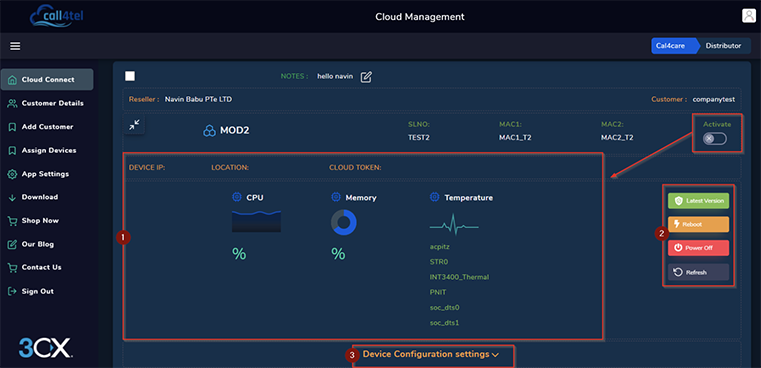The Importance of VoIP Call Quality
The importance of VoIP call quality cannot be overstated. It directly impacts the user and customer experience, productivity, and overall success of communication within an organization. It can be the make or break in a sales deal or the reason a customer stops using your services.
There are times when the quality of your calls could be caused by bandwidth issues, PBX issues or server issues. You need a reliable monitoring tool that can inform you if any issues arise and allows you to be proactive and avoid future problems.
Call4Tel Monitoring Dashboard

The best way to ensure your 3CX PBX is always online and to check all its vital signs is by using the Call4tel Portal to monitor your devices. From here you will see if your device is up to date, the temperature, CPU and memory. In combination with the 3CX VoIP Monitoring Tool in the new V20 Admin Console you can rest assured that nothing will happen without you knowing.
Take a look at our 3CX Appliances and find the one that works best for you.
Or get in touch with our team for a free demo.
The Consequences of Poor VoIP Quality
Below is a brief list of the reasons you need to ensure your VoIP Quality is always up to standard. If you feel that your current setup is not up for the challenge, then we’re happy to help you find a different solution.
- User Satisfaction: Poor call quality can lead to frustration among employees and customers. Clarity, reliability, and consistency in voice communication are vital for effective collaboration and customer service.
- Professionalism: High-quality calls project a professional image for the organization. Clear, crisp voice communication enhances credibility and trustworthiness in business interactions.
- Productivity: Reliable VoIP call quality ensures that employees can communicate seamlessly without disruptions or misunderstandings. Any degradation in call quality can result in wasted time and decreased productivity.
- Customer Experience: For businesses that rely on customer support or sales calls, the quality of VoIP calls directly impacts the customer experience. Clear communication builds rapport, resolves issues efficiently, and fosters customer loyalty.
- Competitive Advantage: In competitive industries, superior communication capabilities can differentiate one business from another. High-quality VoIP calls can give organizations a competitive edge by enabling smoother interactions with clients, partners, and suppliers.
- Cost-Efficiency: Poor call quality may lead to repeated calls, misunderstandings, and the need for additional follow-ups, ultimately increasing communication costs. Ensuring high-quality VoIP calls reduces the likelihood of these issues and optimizes resource utilization.
- Remote Work Support: With the rise of remote work, VoIP has become essential for maintaining communication among distributed teams. Reliable call quality is critical for remote workers to collaborate effectively regardless of their location.
- Brand Reputation: Consistently providing high-quality communication experiences reflects positively on the organization’s brand reputation. Conversely, poor call quality can tarnish the brand image and lead to negative perceptions among stakeholders.
- Compliance and Legal Considerations: In certain industries, such as finance or healthcare, maintaining high-quality VoIP calls is essential for compliance with regulatory requirements regarding data security, privacy, and recordkeeping.
- Future Growth and Innovation: A robust VoIP infrastructure with excellent call quality provides a solid foundation for future growth and the adoption of advanced communication technologies, such as video conferencing, virtual assistants, and artificial intelligence-driven features.
To ensure optimal VoIP call quality, you should invest in reliable network infrastructure, prioritize Quality of Service (QoS) mechanisms, regularly monitor and troubleshoot call performance, and provide ongoing training to users on best practices for using VoIP systems.



